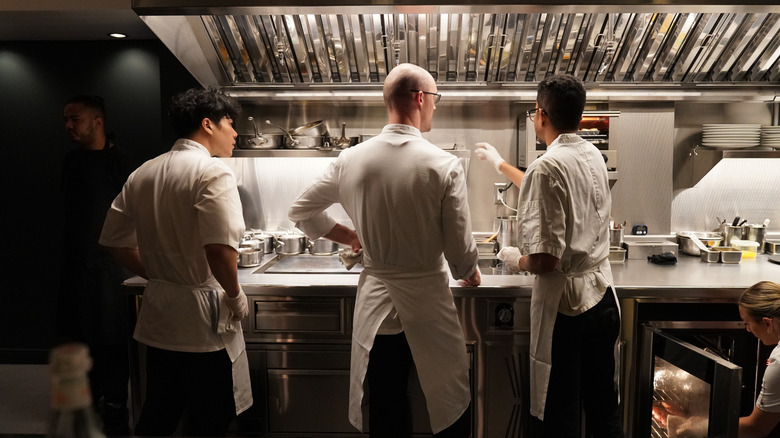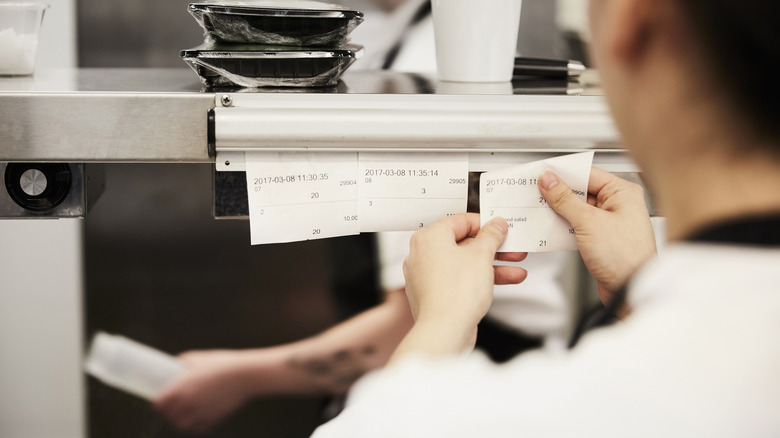Are You Actually The Bad Guy For Ordering Off-Menu At A Restaurant?
Ordering off-menu has a bad reputation. Off-menu orders can come off as insulting to chefs who put a lot of time and effort into curating the menu and developing recipes. Accommodating off-menu orders can also slow kitchen staff down. But what happens if you can't stand (or flat-out can't eat) anything on the menu? Is it ever ok to make special requests? The Takeout asked Dennis Littley, the classically trained chef and recipe developer behind Ask Chef Dennis. With over 40 years in the restaurant industry, Littley is very familiar with the ins and outs of restaurant etiquette.
”If you're going to order off-menu, my number one tip is to be polite, respectful, and reasonable," Littley told The Takeout. "Don't assume you're at your personal chef's table. You're in a working kitchen with systems in place." That doesn't mean ordering off-menu is totally off-limits, though. "It's okay to ask if the kitchen can make a slight modification," he explains. "Grilled chicken instead of fried is doable."
There's a time and a place for ordering off-menu. Some fast food joints have extensive secret menus; a quick search can give you a long list of extra options. Just don't expect the same service from a Michelin star restaurant."Try to get a feel for the place first," Littley says. "Fine dining? Probably not the time. A casual spot where you're a regular? Might go over smoother.”
Do chefs hate it when you order off-menu?
"From the kitchen's side, off-menu requests can be a mixed bag. It's not that chefs hate being accommodating, we genuinely want folks to enjoy their meal," Littley continued. "But when you're in the weeds on a busy Friday night and someone wants a dish you haven't prepped for, it slows down the whole line."
Littley gets that it's impossible to please everyone. "The truth is, the customer isn't always right, but they're always the customer," he says. He adds that your chances of success largely depend on your attitude. "A well-phrased, flexible request is totally fair. A demanding attitude is probably the fastest way to get a hard no," he explains. If your order doesn't come out as expected, be extra polite when you complain about the food — or simply keep it to yourself.
There is one breach of restaurant etiquette that Littley never condones. ”Bringing in outside food or drink is generally a no," he says, noting that bringing ingredients for the chef to cook is especially egregious. It's not just demanding, it's risky. Bringing outside food into the kitchen could violate health code. If you must bring food, clear it with the restaurant beforehand. "The only time [bringing food] might fly is if you've cleared it ahead of time, like bringing in a cake for a birthday, or a special bottle of wine to be opened with corkage," he says.
How to order off-menu
”The smoothest way to go off-menu is to ask your server first and ask nicely," says Littley. He notes that you should read the menu carefully and stay realistic. No, you can't expect stellar sushi from a burger joint. "Something like, 'Hey, I noticed you have grilled salmon on another dish, any chance I could sub that into this bowl instead of chicken?'" he suggests. "That tells the staff you've read the menu, you're not asking for the moon." Pay attention to your surroundings, too. "Don't make big asks at peak rush hour or when the place is clearly slammed," he adds.
No matter how slammed the restaurant is, let your server know if you have allergies or intolerances. People with allergies don't always speak up — but communicating with staff can reduce the chances of a serious reaction. Be sure to explain your specific needs and feel free to ask about preparation. Remember: You still have to keep expectations realistic. Don't expect the chef to make a dairy-free tres leches cake on the fly.
Food allergies don't give you a free pass to bully your server, either. Try to have patience even if they don't seem to take your request seriously. Restaurant staff aren't always educated on food allergies, so don't automatically assume malice. Instead, (politely) ask for the manager. They're more likely to have allergy training.


